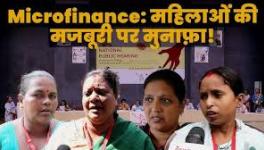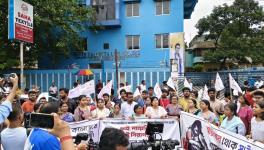TN Elections: A Declining Women Workforce Must be Tackled, Freebies Will Not Suffice
Representational use only.
Promises of women-centric welfare schemes have been crucial to the election campaigns of both the Dravida Munnetra Kazhagam (DMK) and the All India Anna Dravida Munnetra Kazahgam (AIADMK) – parties which have alternately ruled Tamil Nadu for five decades. Election manifestos promise monthly pay for women’s housework, washing machines for every ration card holder and six gas cylinders per family per annum.
Aside from the constraints in accessing these schemes, these so-called ‘freebies’ are said to reduce the burden on women. However, they also reinforce the women’s status quo in society. The status quo is also strengthened with a steep decline in the female labour force participation, pushing more and more women within the four walls of the house.
The elections this year come in the aftermath of the devastating economic effect of the COVID-19 pandemic. How the AIADMK government tackled the crisis and what political parties will promise in the coming days is significant for women. Violence against women has also grown over the past few years and it is a shame that Tamil Nadu used only Rs 28.75 crore out of the Rs 177 crore allotted from the Nirbhaya Fund.
Out of the 6.10 crore voter population in Tamil Nadu, women continue to outnumber men by a million voters.
KICKED OUT OF WORKFORCE
Both the incumbent AIADMK and Opposition DMK have promised a fixed monthly amount to “housewives” if voted to power. It is a welcome move that the big parties are acknowledging domestic chore as work. However, it has been criticised for setting aside household work as a woman’s job, instead of empowering women through education and employment.
Payment for women’s care work needs to be viewed in the backdrop of the steady decline in the female labour force participation (FLFP) rate in the state and the country. It dropped from 31.80% in 2001 to around 25% in the state and from 28.6% in 1993 to an alarming 16.5% in 2017-18 across the country. The number is said to have further dropped drastically during the pandemic.
Unlike the employment rate, the literacy rate of females in Tamil Nadu has improved remarkably – 64% in 2001 to 73% in 2011. Despite a rise in female literacy, the female workforce participation has declined. This implies that a huge proportion of women in Tamil Nadu are literate and educated but are not employed and are primarily engaged in bringing up children, caring for the elderly and carrying out household work.
U. Vasuki, national leader of the All India Democratic Women’s Association (AIDWA), told Newsclick: “Our stand is that women’s work has to be recognised and reduced. The UN has said that the value of domestic work is not quantified. By providing an “urimai thogai” (an amount recognising rights), their work would at least be acknowledged, though not fully compensated for. Secondly, the domestic chores of women have to be reduced if they have to assert themselves in other ways, such as involving in social and political activities, or even to step out for entertainment purposes.” She further added “after the revolution, the Soviet Union consciously reduced the household work of women, that is how they empowered women”.
FACING THE COVID-19 PANDEMIC
Informal Sector
Out of the less than a quarter of women who participate in the workforce in Tamil Nadu, the majority are employed in the informal sector. The share of female workers (94.50%) in the country is more than male workers in the informal sectors, and it was terribly affected by the COVID-19 lockdown.
“Women faced and continue to face the brunt of the Corona pandemic. Neighbourhood flower sellers, fish stall owners, vegetable vendors, idli shops… are all run by women and they struggled for survival,” said G. Manjula, state secretary of the National Federation of Indian Women.
MNREGA
Though workforce participation has seen steep decline in Tamil Nadu, women make up around 85% of those under MGNREGA. workers. The design and wage rate of the scheme encourages participation of women in a significant way. Due to the lockdown women faced a major loss of work during the pandemic. In the delta districts alone around 40,000 workers were engaged under the scheme when the clampdown came into effect in March 2020.
The All Women Federation (AWF), an umbrella body of around 40 women’s organisations in Tamil Nadu, has been demanding an increase in minimum per day wage from Rs 263 to Rs 400 and that the number of work days per year be increased from 100 to 200. The demand for a similar Act to ensure employment guarantee in urban areas has also been raised.
Pawning for Money
A practice common among women is pawning gold or silver when money was needed, a practice largely followed to overcome financial hurdles created by the pandemic. Many women were trapped, faced hardships from pawn brokers and couldn’t pay the interest or retrieve their collateral.
Chief Minister Palaniswami waived off loans taken on pledged gold of up to six sovereigns, but it was applicable to loans via cooperative banks. G. Saraswathi, a clerk in Chennai, was out of work during the pandemic. “I was eager to claim the waiver for the loan I had taken, but I was disappointed to hear that it is only for cooperative bank loans,” she said.
Self Help Groups
In February this year the incumbent AIADMK government, ahead of the elections, provisioned for writing off loans taken by Self Help Groups (SHGs). These committees of women work as a cooperative to produce small-scale goods and make profits as a community. They were primarily set up for self-sustenance and alleviation of poverty. But, due to lack of markets for their products, they have been finding it difficult to get by.
“Markets were not created for SHGs. If appalams are produced by SHGs, where will they sell it in this competitive world? They are made to compete with big corporate produce. Thereby, the SHGs take loans, which the government has to waive off from time to time. The government has to take up the responsibility of creating markets for their products,” said Manjula.
VIOLENCE AGAINST WOMEN UNNOTICED BY GOVT
Data reveals that 336 rape cases took place in Tamil Nadu in 2016, 294 in 2017 and 341 in 2018. The immediate response of the Tamil Nadu government was to push for stricter punishment for crimes against women and children in September 2020.
“Tamil Nadu State Commission for Women, which is a statutory body constituted to deal with cases related to crimes against women, is dysfunctional,” said Manjula. Mentioning that the body was functioning much better earlier she said “the body is of importance. It could have easily taken up the Pollachi sexual harassment case. But, it no longer has a perspective on violence against women.”
Get the latest reports & analysis with people's perspective on Protests, movements & deep analytical videos, discussions of the current affairs in your Telegram app. Subscribe to NewsClick's Telegram channel & get Real-Time updates on stories, as they get published on our website.
























